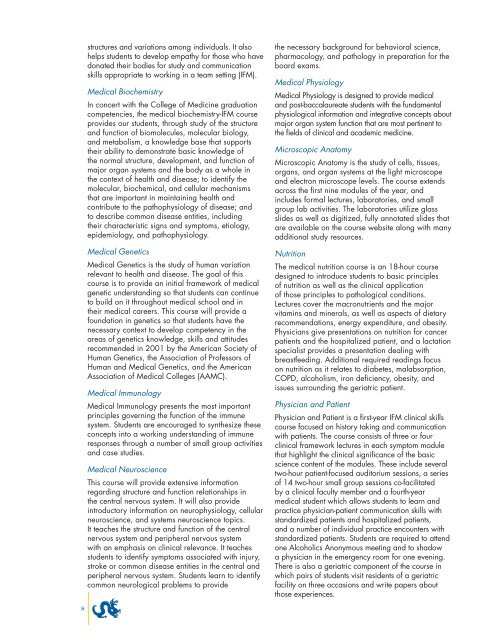Download Student Information 2012-2013 - Drexel University ...
Download Student Information 2012-2013 - Drexel University ...
Download Student Information 2012-2013 - Drexel University ...
Create successful ePaper yourself
Turn your PDF publications into a flip-book with our unique Google optimized e-Paper software.
structures and variations among individuals. It also<br />
helps students to develop empathy for those who have<br />
donated their bodies for study and communication<br />
skills appropriate to working in a team setting (IFM).<br />
Medical Biochemistry<br />
In concert with the College of Medicine graduation<br />
competencies, the medical biochemistry-IFM course<br />
provides our students, through study of the structure<br />
and function of biomolecules, molecular biology,<br />
and metabolism, a knowledge base that supports<br />
their ability to demonstrate basic knowledge of<br />
the normal structure, development, and function of<br />
major organ systems and the body as a whole in<br />
the context of health and disease; to identify the<br />
molecular, biochemical, and cellular mechanisms<br />
that are important in maintaining health and<br />
contribute to the pathophysiology of disease; and<br />
to describe common disease entities, including<br />
their characteristic signs and symptoms, etiology,<br />
epidemiology, and pathophysiology.<br />
Medical Genetics<br />
Medical genetics is the study of human variation<br />
relevant to health and disease. The goal of this<br />
course is to provide an initial framework of medical<br />
genetic understanding so that students can continue<br />
to build on it throughout medical school and in<br />
their medical careers. This course will provide a<br />
foundation in genetics so that students have the<br />
necessary context to develop competency in the<br />
areas of genetics knowledge, skills and attitudes<br />
recommended in 2001 by the American Society of<br />
Human genetics, the Association of Professors of<br />
Human and Medical genetics, and the American<br />
Association of Medical Colleges (AAMC).<br />
Medical Immunology<br />
Medical Immunology presents the most important<br />
principles governing the function of the immune<br />
system. <strong>Student</strong>s are encouraged to synthesize these<br />
concepts into a working understanding of immune<br />
responses through a number of small group activities<br />
and case studies.<br />
Medical Neuroscience<br />
This course will provide extensive information<br />
regarding structure and function relationships in<br />
the central nervous system. It will also provide<br />
introductory information on neurophysiology, cellular<br />
neuroscience, and systems neuroscience topics.<br />
It teaches the structure and function of the central<br />
nervous system and peripheral nervous system<br />
with an emphasis on clinical relevance. It teaches<br />
students to identify symptoms associated with injury,<br />
stroke or common disease entities in the central and<br />
peripheral nervous system. <strong>Student</strong>s learn to identify<br />
common neurological problems to provide<br />
the necessary background for behavioral science,<br />
pharmacology, and pathology in preparation for the<br />
board exams.<br />
Medical Physiology<br />
Medical Physiology is designed to provide medical<br />
and post-baccalaureate students with the fundamental<br />
physiological information and integrative concepts about<br />
major organ system function that are most pertinent to<br />
the fields of clinical and academic medicine.<br />
Microscopic Anatomy<br />
Microscopic Anatomy is the study of cells, tissues,<br />
organs, and organ systems at the light microscope<br />
and electron microscope levels. The course extends<br />
across the first nine modules of the year, and<br />
includes formal lectures, laboratories, and small<br />
group lab activities. The laboratories utilize glass<br />
slides as well as digitized, fully annotated slides that<br />
are available on the course website along with many<br />
additional study resources.<br />
Nutrition<br />
The medical nutrition course is an 18-hour course<br />
designed to introduce students to basic principles<br />
of nutrition as well as the clinical application<br />
of those principles to pathological conditions.<br />
Lectures cover the macronutrients and the major<br />
vitamins and minerals, as well as aspects of dietary<br />
recommendations, energy expenditure, and obesity.<br />
Physicians give presentations on nutrition for cancer<br />
patients and the hospitalized patient, and a lactation<br />
specialist provides a presentation dealing with<br />
breastfeeding. Additional required readings focus<br />
on nutrition as it relates to diabetes, malabsorption,<br />
COPD, alcoholism, iron deficiency, obesity, and<br />
issues surrounding the geriatric patient.<br />
Physician and Patient<br />
Physician and Patient is a first-year IFM clinical skills<br />
course focused on history taking and communication<br />
with patients. The course consists of three or four<br />
clinical framework lectures in each symptom module<br />
that highlight the clinical significance of the basic<br />
science content of the modules. These include several<br />
two-hour patient-focused auditorium sessions, a series<br />
of 14 two-hour small group sessions co-facilitated<br />
by a clinical faculty member and a fourth-year<br />
medical student which allows students to learn and<br />
practice physician-patient communication skills with<br />
standardized patients and hospitalized patients,<br />
and a number of individual practice encounters with<br />
standardized patients. <strong>Student</strong>s are required to attend<br />
one Alcoholics Anonymous meeting and to shadow<br />
a physician in the emergency room for one evening.<br />
There is also a geriatric component of the course in<br />
which pairs of students visit residents of a geriatric<br />
facility on three occasions and write papers about<br />
those experiences.<br />
8

















